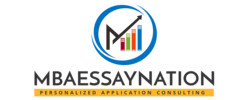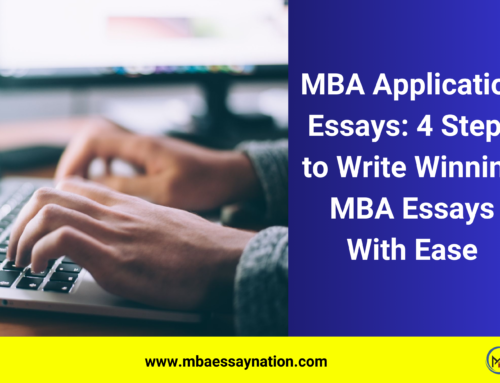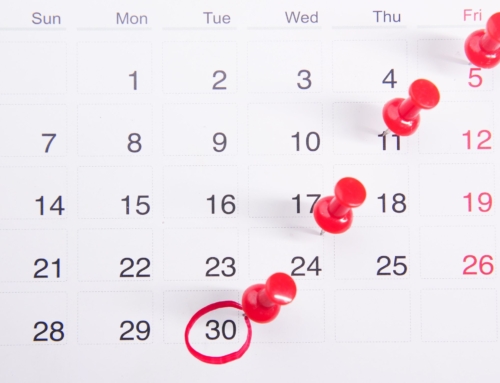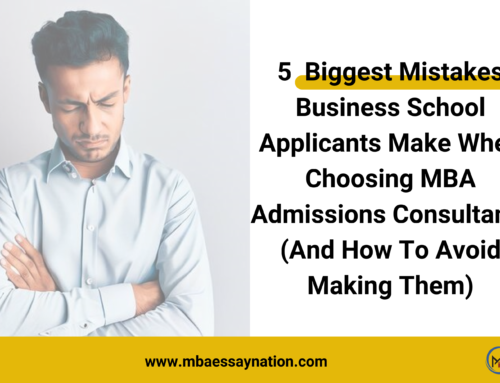How To Answer The Toughest MBA Interview Question: Tell Me About Yourself (Super specific tips, tactics, and real examples included)
The first thing that occurs to every MBA applicant who gets called for their business school interview is to figure how to answer the toughest MBA interview question which is Tell me about yourself.
Picture this –
You have your best smile on, secretly hoping you are able to mask your nervousness well.
Your interviewer smiles at you, leans forward, and then asks the question that strikes terror in the sturdiest of hearts.
“Tell me about yourself”
You start to stutter, fumble, and panic.
Suddenly, you don’t remember a thing about yourself.
Or, you don’t know where to start so you start talking. Just. Like. That.
Over the years, I’ve interviewed — both at MBAEssayNation and on the interview panel of ISB — hundreds of applicants. And most struggle to respond well to this question.
What I have done is analyzed the best and the worst of responses to this much-dreaded question.
So, by the end of this post, you will walk away with the exact formula to answer this question like a pro.
Let’s get started, shall we?
First things First
Why is this question important?
For 2 reasons,
- More than 99% interviews open with this question
- Most interviewers make up their mind within the first 3 minutes of the interview
Why do interviewers kickstart interviews with this question?
The interviewers want to assess 2 things when they ask this question –
How meaningful your academic and professional experiences have been?
- Will you add value to the business school?
- What attributes, experience, knowledge, attitude, and aspirations differentiate you from the other candidates?
How well are you able to communicate both clearly and succinctly?
- How good are your communication skills?
- How do you interact with others?
- How do you respond under pressure?
- How strong are your language skills?
- Do you have the gravitas to succeed not just at the business school but also be hire-able in management and leadership roles post your MBA?
Put yourself in your interviewer’s shoes who has to first sift and then pick out the best from the applicant pool.
How do you make it easy for them to decide? It’s by knowing
- What’s going to get your interviewer’s attention?
- What’s your interviewer going to be most impressed by?
As the saying goes, “First impression is often the last one”.
“Tell me about yourself” is your golden opportunity to set yourself apart from others and that’s why it’s super important to get this question right.
What makes this question a difficult one?
Most applicants, when responding to this question, do so by simply rehashing their resume –
“I have done B.Tech in mechanical engineering from NIT, Trichy. In July 2015, I started as a design analyst, analysing design feasibility of Tata Motors air conditioners and engine components. In May 2017, I moved to the Sales and marketing function of Ashok Leyland. In November 2018, I got promoted to a Senior Marketing…”
“My name is Sumit Kumar. I was born in Lucknow and grew up there. I did my graduation at College of Engineering Pune in Instrumentation Engineering. I passed my course with distinction. Then I joined Texas Instruments in Bangalore where I was working on TI Interactive. I then moved back to Pune to join a startup called Foodie, which is in the restaurant aggregator and food delivery business. I am still working there. In my spare time, I like to listen to music, read science books and watch movies. I am also part of an NGO”
Zzzzz…
By this point, your interviewers start zoning out.
There’s nothing interesting that stands out.
It’s just one event followed by another.
Often, delivered in a monotone. Guaranteed to turn off your interviewers from the word go.
Now, you see what makes responding to this question such a huge challenge for most applicants.
So, why do smart, capable individuals end up giving such tepid, ineffective responses to begin with?
That’s because for many this is such an open-ended question that they are unsure how best to answer it.
Either they ramble on, sharing inane information or give such cryptic responses to the point of appearing curt!
How should you respond to this question?
Introducing MBAEssayNation’s 3Ps framework for interviews – heck, what’s a b-school interview guide without a framework 😊
The first P – Plan Your Response With These 6 Elements
Include these 6 elements to craft your powerful response –
- Provide high-level overview of your academic and professional journey
- Highlight why you’re passionate about your work
- Emphasize 1-2 key experiences and proven successes
- Outline promotions, awards and recognitions
- Elaborate on the reasons for transitioning from one role/job to another
- Cite your personal interests and why they’re important
Are all 6 elements created equal?
Do you have to absolutely include all 6 elements when building your response?
It depends.
If you are say, an experienced professional who graduated college 5-10 years back, your academic credentials are not as important as your professional experience. The more work experience you have, the more important it is to highlight your successes at work.
But if you are a recent graduate, then your academic journey should form an important part of your narrative.
My advice would be to use your judgement when you pick the “must-haves” for your answer.
And the way to do so is to identify the top 2 most impactful and preferably, most recent experiences and achievements.
It’s a good idea to include personal interests to show your multi-faceted personality, again another key consideration business schools use in their shortlisting process.
In case you are wondering whether these elements have to be in a certain sequence, don’t worry. Weave these elements in any order that helps you advance your narrative in a compelling way.
In just a moment, you’ll see how to apply these elements to your answer.
The second P – Prepare Your Response
Identify and keep the main points handy –
Preferably, take a bullet point approach rather than a scripted approach
The third P – Practice Your Response
Make sure your response is just 2-3 minutes long
Let’s dig into some responses to “Tell me about yourself?”
Example 1
“I am Sumit Kumar, an Instrumentation Engineering graduate from College of Engineering Pune. I like to use my analytical abilities to develop world-class products in the restaurant aggregator and food delivery domain. When I am not working, I like to read about astrophysics since I am intrigued by brilliant minds like Neil DeGrasse Tyson. I also like to give back to society and am an active member of an NGO through which we teach underprivileged kids on weekends”.
What do you think of this response?
Is it good or average?
Let’s start by analyzing its structure to understand how effective it is –
Structure
Starts with academic credentials
Mentions a skill and links it with his professional experience
Mentions personal interest and the reason for the interest
Mentions another personal interest, reason for the interest and an experience related to the interest
Analysis
To analyse the response, let’s refer to the list of 6 elements from the plan stage of the 3Ps framework.
Firstly, there’s no mention of a significant achievement at work which could’ve been an important differentiator – essentially, there’s nothing memorable about his professional experience.
His personal interests are good but could be strengthened if he were to mention skills and achievements gained by pursuing his interests.
For instance, he can talk about how reading has helped him become more open-minded and enabled him to look at problems from different angles or how reading has helped him improve his analytical skills and so on.
Similarly, for his work with the NGO, he could talk about how he has successfully taught x number of kids to improve their proficiency levels in a certain subject from say, basic to intermediate.
Another point to remember is that there’s no need to mention your name because you would’ve had the chance to introduce yourself by the time this question is asked. Even otherwise, the interviewers have your application file. They know your name before they call you for the interview. Stating your name again during the interview not only is redundant but also sounds forced and scripted.
Overall Verdict – Average Response
Example 2
“I am an IT services professional working with one of India’s top 10 IT firms. I have worked with clients across USA and Europe to help them increase efficiencies in their CRM related business processes. I was part of the team delivering Wells Fargo’s mortgage evaluation system and my work not only helped me understand the business side of large banks but also made me realize that my true interests lie in the finance domain. Outside of work, I have a keen interest in current affairs, reading history and listening to classical music.”
Structure
Starts with professional credentials
High level overview of professional experience
Mentions a specific experience and takeaways in terms of knowledge and an interest area
Lists three personal interests
Analysis
Again, keep the 6 elements’ list handy, and check whether the response has all the elements.
The response is to the point. And cryptic.
Why cryptic?
It cites one important client experience to highlight an epiphany the candidate had but it mentions no memorable achievement or even why the candidate felt his true calling was in finance. This renders the response as generic because nothing about his professional experience really stands out.
His personal interests are, again, just an enumeration of interests with no attempt at explaining why he’s interested in them or how these interests have served him in terms of skills or experience gained.
Overall Verdict – Average Response
Example 3
“I am a fresher who is in my final year engineering. Even though my major is Electronics and Telecommunications, I have always had a keen interest in how increasingly companies are using technology to solve business problems. I am an avid reader of The Financial Times and the Harvard Business Review. I am an active participant in college events and have been on the management committee of my college’s annual festival. I also love challenging myself through jigsaw puzzles and brain teasers.”
Structure
Starts with academic credentials
Mentions where his real interests lie
Attempts to connect interests with specific activities
Mentions two extra-curricular activities
Mentions additional extra-curricular activities
Analysis
Though the candidate talks about his interest in seeing how companies are using tech to solve problems, he makes a broad statement which lacks personalization. He could’ve been specific in terms of looking at specific business problems or specific technologies, given that he’s in his final year of engineering. There’s a clear lack of depth.
An avid reader of publications such as ET and HBR is fine but how has reading these publications helped the candidate in terms of knowledge, skills, or experience?
The candidate attempts to showcase leadership experience by citing his extra-curricular activities at college. However, being an active participant at college events or being on the management committee doesn’t give any clarity about why this individual has taken up those activities, what skills he has gained and/or what results he has achieved through those activities.
Overall Verdict – Average Response
Example 4
“I am a commerce graduate with 3 years’ experience in the banking space. I work in the credit card department and am part of a team of 9 which handles all credit card clients of Citibank in Pondicherry. I have been awarded the most valuable employee of my bank branch last year due to my focus on customer service and process improvement. I am an avid music lover and I am also the lead guitarist in a local band.”
Structure
Starts with academic credentials
Provides summary of work experience
Mentions one significant achievement at work
Extra-curricular interests and activity
Analysis
It’s a succinct response but with no attempt at explaining the reason behind his career choice.
The candidate cites one important achievement at work. However, he could have emphasized the importance of the award that he won at work by giving some relative aspect such as “the award is generally given to only 1% of employees” or “I was the only employee with less than 5 years of experience to have won the award”, and so on.
The personal interest looks promising but because he doesn’t highlight any key skills, experience, or takeaways from his interest, that part again, doesn’t rise above average.
While on the surface, this looks like a good response but skim the surface and there’s nothing memorable about the response. As a result, he comes across as someone who has gone with the flow in terms of his career choices even though he has potential as indicated by his professional achievement and personal interests.
Overall Verdict – Average Response
Example 5
I am a tech entrepreneur with a passion for both computers and rock climbing.
This is why I chose to pursue my undergrad in computer science. During undergrad, I led computer science conferences for my college as the Conference Club VP. This made me a much more confident communicator.
Prior to graduation, I wanted to gain some hands-on experience in a big tech company so I can learn from the best. I worked at Google as a software engineer where I focused my time on improving the way the Google Maps classifies hiking and climbing routes. I learned how to work in a team efficiently, and how good working relationships add synergy to the output.
After graduating, I launched an augmented reality app providing climbers with optimal route when directing the camera at a mountain. I built a prototype, established a team, and won a pitch competition, winning us a spot at XYZ accelerator.
Now, I want to take my technical knowledge, entrepreneurial drive, and passion for sports and supplement it with a business knowledge, a sports analytics toolset, and a network. I think that an MBA here is the best path to do so.
Structure
Opens response with a high-level overview of his professional career trajectory and personal interests
Mentions academic credentials
Mentions first professional experience
Mentions second professional experience along with an achievement
Summarizes strengths and gaps in his profile
Analysis
The candidate starts his response with a “Hook”.
With his opening sentence, the candidate has managed to create a memorable introduction, primarily because it’s intriguing. As an interviewer, I’d be curious to know why this person has decided to use two seemingly unrelated attributes to introduce himself.
He then goes on to elaborate, throughout his response, how the two attributes have been important in shaping his professional experience.
Not just that, he explains the “Why” behind every decision he has made, be it his academic or his career choices.
Another important aspect of his response has been to highlight what he has gained from his experiences in terms of skills, insights, and achievements.
He concludes his response by talking about how he’d like to plug the gaps in his profile while leveraging his strengths.
Overall Verdict – Good Response
Example 6
I am a music producer turned programmer turned product leader.
I published my first EDM record when I was 19, it was played by the world’s top DJs and gave me a boost of confidence in my ability. The journey of becoming an EDM producer had stimulated my interested in tech, as I programmed my very own virtual instruments to create a distinct sound signature in my tracks.
I started developing and eventually worked as a developer for a startup targeting artists and labels. I designed and built an algorithm for detecting plays across platforms as means to track royalties. Since we had no product managers, I researched the industry myself and spoke with labels and artists to understand their needs. This had taught me about customer obsession and how I enjoy diving deep into the data to make informed decisions.
I progressed to become the company’s first-ever product manager and crafted the company’s product strategy. I gained full P&L responsibility on our label funnel and was able to increase our label revenues 20% year over year by focusing on the label’s needs to uncover smaller artist DJ plays in mid-sized venues.
Now it’s time for me to take the next step as a product manager at YouTube Music, and focus on customer facing experiences.
Structure
Opens response with a high-level overview of his professional career trajectory
Mentions first professional experience
Mentions second professional experience
Mentions third professional experience
States aspirations
Analysis
The opening sentence’s structure makes the response memorable by summing up the three important roles played so far by the candidate.
He then follows it up by explaining how each role led to his next role.
He does so by elaborating on his first role, citing an achievement, and skills gained. He then talks about how interest in his second role was triggered due to his experience from his first role.
Similarly, he elaborates on his second role, the type of company he worked with, highlights his experience and how he overcame a certain challenge while discovering what he was passionate about.
He talks about how he took up his third role, his experience and outlines an achievement in that role.
Finally, he concludes by briefly talking about his aspirations.
Though he doesn’t explicitly mention his personal interests, it’s clear he’s passionate about music, evident from the way he has evolved his career around it.
And while he hasn’t talked about his academic credentials, he has consciously positioned his professional accomplishments as the focus of his response.
Overall Verdict – Good Response
Example 7
“I am a 7+ year veteran of database administration, managing million-dollar databases for enterprise clients across USA and Asia. I have been always been passionate about using technology to improve client experience and to optimize processes that will result in greater efficiencies and cost savings for my organization and my clients.
For instance, recently, I learned that my company was about to overhaul its database technology and was planning to rope in an external consulting firm for the project. I reached out to the Senior Director managing the project and told him that I had done a similar project for one of my largest clients, outlined how we could execute the project with our own staff, and successfully completed the project within 6 months. This resulted in a savings of $150K, an achievement for which I was lauded by the senior management.
I have parlayed my deep interest in technology by learning continuously about the latest database technologies. A keen advocate of paying it forward by sharing my knowledge, I started a blog on database administration. The blog, just 2 years old, has already helped build a 400+ strong community of database enthusiasts.
I am also an avid reader and enjoy reading on a host of topics from technology, productivity to science.
Through my reading and blogging activities, I have also learned how to become more effective at communicating and have immensely enjoyed networking around the globe.
On the academic front, I received my BSc in IT from Pune University and I was clear that I’d pursue my masters when the time is right.
At this juncture, I am keen to strengthen my technical knowledge with a formal and holistic understanding of business and leadership. And I think that an MBA is the best path to do so.”
Structure
The opening sentence starts with a summary of his professional experience, given the applicant has a good number of years of work experience.
He then talks about why he enjoys his work and then gives a concrete example of a recent achievement to demonstrate his passion at work.
Next, he talks about how even through his personal interests, he is committed to continuous learning and cites an achievement to illustrate his point.
He talks about another personal interest before summarizing the skills gained from his personal interests.
Briefly broaches his academic qualifications before connecting it with his future aspirations.
Analysis
Ticks all the boxes!
Highlights Experience | Skills | Achievements | Recognition | Interests | Aspirations
Importantly, mentions the “Why” behind each experience, rendering his response as convincing and compelling.
Overall Verdict – Good Response
Exercise 01
Now that you have seen examples of both good and average responses, let’s recap what we have learned by analyzing another example –
“I received my BBA in Accounting from the University of Illinois and then went to work for EY after graduation. I passed the CPA exam on my first try and have progressed well in my career. I was recently promoted from Staff Auditor to Senior Auditor and was selected to train new hires in our region on recent GAAP accounting changes.”
What do you think of this response?
Take a few minutes to jot down its structure and to analyze it.
So, what’s your verdict?
If it matches with mine, then that’s an “Average Response”.
Let’s try another exercise and see how we can make it better.
Exercise 02
Try adding the 6 elements to the version above. Take 5 mins to just outline a structure. Then check out the version below –
Improved Version
“I have always enjoyed working with numbers and that’s why I decided to pursue BBA in Accounting from the University of Illinois.
Right out of college, I was hired by EY for its accounting division. Since I started out 2 years ago, I have progressed well in my career.
I was among the top 5% in my cohort to be chosen for an early promotion and have recently been promoted from Staff Auditor to Senior Auditor.
Because the client accounts I work with are from industry X, I have developed a good understanding of X. However, I realize working for diverse industries would provide me better opportunities to understand different businesses. And a CPA would provide me the credibility to pivot to work with clients from different industries. Last year, I prepared and passed the CPA exam on my first try.
The management, recognizing my passion for accounting, chose me to train 50 new hires on recent accounting changes. This proved to be an enriching experience as I learned how to communicate with clarity and developed greater creativity in explaining various concepts. The best testament to my efforts was when I received a high rating of 4.6 out of 5 for my training.
Outside of work, I enjoy reading about history and psychology. Through my interests, I have recognized that while the objectivity of absolute numbers can render everything as either black or white, it’s the subjectivity of human actions that emphasizes why grey areas are important to understand a context better.
While I have focused on building my technical skills, I am keen to take up leadership roles at work. To do so, I recognize I would have to supplement my accounting experience with leadership and people management skills. An MBA at this point would be the perfect opportunity for me to do so.”
Does the new version match with what you have come up with?
Don’t worry if it isn’t an exact match because it doesn’t have to be.
The structure would vary from person to person, depending on what each perceives as important and decides to accordingly prioritize.
Therefore, what you need to focus on when creating your response is to ensure that the 6 elements from the Plan stage are part of your response.
Now once you have your response ready, let’s look at the next P, the Prepare stage.
Prepare Stage
Identify the main points you’d like to cover in your response – use the 6-elements structure to keep the points handy.
While there are many candidates who like to write full scripts of their responses and memorize them before their interviews, we recommend taking a bulleted approach.
It’s a safer option.
Unless, you are blessed with a photogenic memory and can remember your entire written responses, word by word, it’s best to know the key points comprising your response.
Practice Stage
3 tips to remember while practicing
- Time yourself to ensure your responses don’t go beyond 2-3 minutes
All the examples that we have seen so far can be stated in less than 3 minutes. Go on, give it a try!
- Use pauses strategically
Most applicants respond in a monotone sounding robotic and rehearsed. So, keep your tone conversational when sharing your response. The key to sounding convincing is to be your natural self, the way you talk with your friends and colleagues.
- Breath normally.
This will help you manage breathlessness.
I’ll be releasing a guide shortly with detailed tips on practicing, voice modulation and tone. Sign up here if you are interested.
Why Intent Matters
Intentionally Designing Your Professional and Personal Interests
To reiterate, the best answers are those that show how your professional and personal interests complement or supplement each other.
But as we’ve seen, most responses on professional experience might be along these lines –
“I began my career in retail management, but a few years ago, I was drawn to the healthcare space. I then joined a hospital as an administrator..”
Whereas most responses on personal interests will be some variant of the below response
“Outside of the office, I’m an avid reader and I love to hike. On weekends, you might find me at the local bookstore or exploring hiking trails in the area.”
If it were a regular conversation, the above two examples will pass of as good instances.
But during a business school interview, where you have to make yourself memorable through your experience and accomplishments, every single piece of information you share should be backed by an intention – an intention to highlight some distinguishing aspect, attribute, or an achievement of yours.
In the above example on professional transitions, if the candidate were to explain their intention behind segueing from one industry to another, it demonstrates how a clear “Why” guides the important choices they have made in their career.
Likewise, for the personal interests, the applicant can demonstrate a clear intent behind why her personal interests matter by highlighting how her interests complement her professional journey. For instance, she can talk about how her two activities allow her to take a step back, reflect, and learn from diverse topics, which in turn has helped her become a better problem solver at work.
In crafting your response to “Tell me about yourself”, find ways to show
- The “Why” behind every decision and choice you have made – be it professional or personal
- Highlight the skills gained from your interests in your professional and personal space
“Walk me through your resume” vs “Tell Me about yourself”
2 Sides Of The Same Coin?
Yes and No.
Both questions can be answered in similar ways. Except for one minor difference.
With “Tell me about yourself”, it’s appropriate to include some personal details such as where you grew up, interesting information about your childhood or schooling.
But with “Walk me through your resume”, the focus is on the information you’d have included in your resume, information that typically starts with your academics.
Dos and Don’ts
Do
- Provide supporting examples to highlight skills, attributes, and achievements
- Quantify details and outcomes
- Emphasize your unique personality
Don’t
- Mention highly personal information such as age, marital status, political affiliations and so on
- Enumerate a long list of vague experiences, achievements, and strengths
- Summarize your resume word for word
To Conclude
Fundamentally, “Tell me about yourself” really boils down to “What do you want the interviewer to remember about you?”
When you answer this opening question well, it gives you the power
- to make a good first impression, and
- to direct the rest of the interview to your benefit
Finally, a quick recap –
- Follow the 3Ps framework to create your answer
- Write your answer using the 6 elements from the Plan stage
- Analyze the structure of your response and refine it till you are comfortable
- Prepare by internalizing the main points of your response
- Practice well, keep your response under 3 minutes
- Use pauses strategically
- Remember to breathe!
Found this interview guide useful?
I’ve created a comprehensive eBook, “Basics to Champion : 29 Tips to Build A Compelling Business School Application”.
It’s a stunning looking book, packed with valuable insights delivered through lots of easy-to-digest infographics!
Over 3000 people have downloaded it so far, and the feedback has been amazing. Download your copy of “Basics to Champion : 29 Tips to Build A Compelling Business School Application” here
If you want to know about the most powerful body language tips for your MBA interview, check out our article on
10 Powerful Body Language Tips to Ace Your Business School Interview







